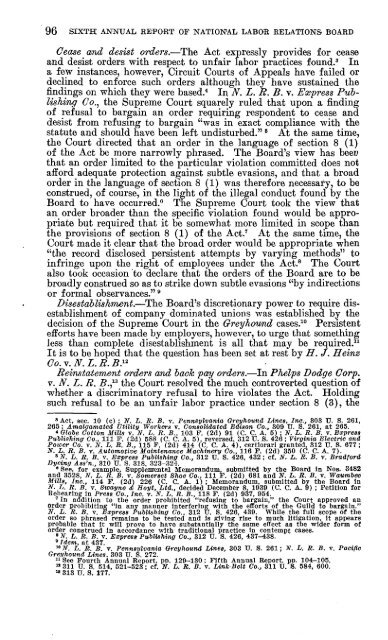NATIONAL LABOR RELATIONS BOARD
NATIONAL LABOR RELATIONS BOARD
NATIONAL LABOR RELATIONS BOARD
Create successful ePaper yourself
Turn your PDF publications into a flip-book with our unique Google optimized e-Paper software.
96 SIXTH ANNUAL REPORT OF <strong>NATIONAL</strong> <strong>LABOR</strong> <strong>RELATIONS</strong> <strong>BOARD</strong><br />
Cease and desist orders.—The Act expressly provides for cease<br />
and desist orders with respect to unfair labor practices found. 3 In<br />
a few instances however, Circuit Courts of Appeals have failed or<br />
declined to enforce such orders although they have sustained the<br />
findings on which they were based. 4 In N. L. R. B. v. Express Publishing<br />
Co.<br />
'<br />
the Supreme Court squarely ruled that upon a finding<br />
of refusal to bargain an order requiring respondent to cease and<br />
desist from refusing to bargain "was in exact compliance with the<br />
statute and should have been left undisturbed." 5 At the same time,<br />
the Court directed that an order in the language of section 8 (1)<br />
of the Act be more narrowly phrased. The Board's view has beeia<br />
that an order limited to the particular violation committed does not<br />
afford adequate protection against subtle evasions, and that a broad<br />
order in the language of section 8 (1) was therefore necessary, to be<br />
construed, of course, in the light of the illegal conduct found by the<br />
Board to have occurred.° The Supreme Court took the view that<br />
an order broader than the specific violation found would be appropriate<br />
but required that it be somewhat more limited in scope than<br />
the provisions of section 8 (1) of the Act. 7 At the same time, the<br />
Court made it clear that the broad order would be appropriate when<br />
"the record disclosed persistent attempts by varying methods" to<br />
infringe upon the right of employees under the Act!' The Court<br />
also took occasion to declare that the orders of the Board are to be<br />
broadly construed so as to strike down subtle evasions "by indirections<br />
or formal observances." 9<br />
Disestablish,ment.—The Board's discretionary power to require disestablishment<br />
of company dominated unions was established by the<br />
decision of the Supreme Court in the Greyhound cases. 1° Persistent<br />
efforts have been made by employers, however, to urge that something<br />
less than complete disestablishment is all that may be required.11<br />
It is to be hoped that the question has been set at rest by H. J. Heinz<br />
Co. v. N. L. B. B.12<br />
Reinstatement orders and bade pay orders.—In Phelps Dodge Corp.<br />
v. N. L. R. B.,13 the Court resolved the much controverted question of<br />
whether a discriminatory refusal to hire violates the Act. Holding<br />
such refusal to be an unfair labor practice under section 8 (3), the<br />
Act, sec. 10 (c); N. L. R. B. v. Pennsylvania Greyhound Lines, Inc., 303 U. S. 261,<br />
265; Amalgamated Utility Workers v. Consolidated Edison Co., 309 U. S. 261, at 265.<br />
4 Globe Cotton Mills v. N. L. R. B., 103 F. (2d) 91 (C. C. A. 5) ; N. L. R. B. v. Express<br />
Publishing Co., 111 F. (2d) 588 (C. C. A. 5), reversed, 312 U. S. 426; Virginia Electric and<br />
Power Co. v. N. L. R. B., 115 F. (2d) 414 (C. C. A. 4), certiorari granted, 312 a S. 677;<br />
N. L. R. B. v. Automotive Maintenance Machinery Co., 116 F. (2d) 350 (C. C. A. 7).<br />
5 N. L. H. B. v. Express Publishing Co., 312 U. S. 426, 432; cf. N. L. R. B. v. Bradford<br />
Dyeing Ass'n., 810 U. S. 318, 323-324.<br />
'See, for exam ple, SuPPlem'ental Memorandum, submitted by the Board in Nos. 3482<br />
and 3528, N. L. R. B. v. Somerset Shoe Co., 111 F. (2d) 681 and N. L. R. B. V. Waumbec<br />
Mills, Inc., 114 F. (2d) 226 (C. C. A. 1) ; Memorandum, submitted by the Board in<br />
N. L. R. B. v. Fwayn c Hoyt, Ltd., decided December 8, 1939 (C. C. A. 9) ; Petition for<br />
Rehearing in Press Co., Inc. v. N. L. R. B., 118 F. (2d) 937, 954.<br />
7 In addition to the order prohibited "refusing to bargain," the Court approved an<br />
Order prohibiting "in any manner interfering with the efforts of the Guild to bargain."<br />
N. L. R. B. v. Express Publishing Co., 312 U. S. 426, 439. While the full scope of the<br />
order so phrased remains to be tested and is giving rise to much litigation, it appears<br />
probable that it will prove to have substantially the same effect as the wider form of<br />
order construed in accordance with traditional practice in contempt cases.<br />
N. L. R. B. v. Express Publishing Co., 312 U. S. 426, 437-438.<br />
9 'dem, at 437.<br />
"N. L. R. B. v. Pennsylvania Greyhound Lines, 303 U. S. 261; N. L. R. B. v. Pacific<br />
Greyhound Lines, 303 U. S. 272.<br />
n See Fourth Annual Report. pp. 129-130; Fifth Annual Report. po. 104-105.<br />
311 U. S. 514, 521-523; cf. N. L. R. B. v. Link-Belt Co., 311 U. S. 584, 600.<br />
15 313 U. S. 177.
















